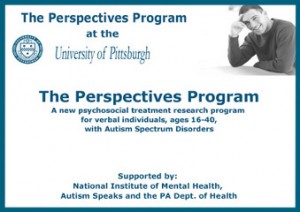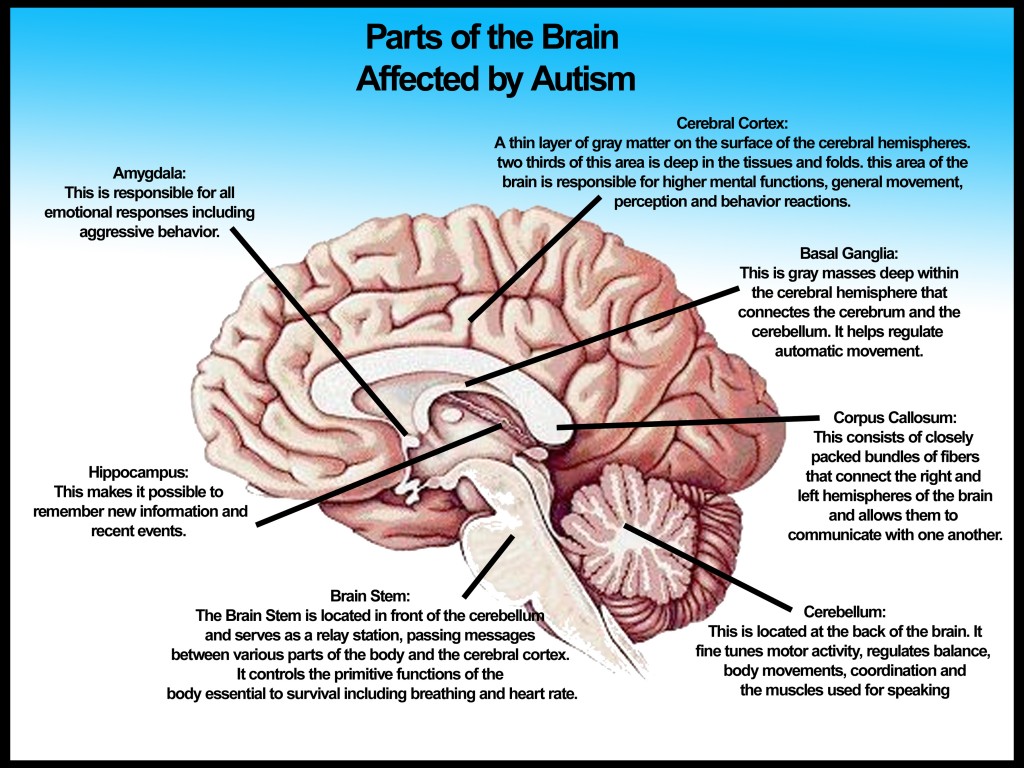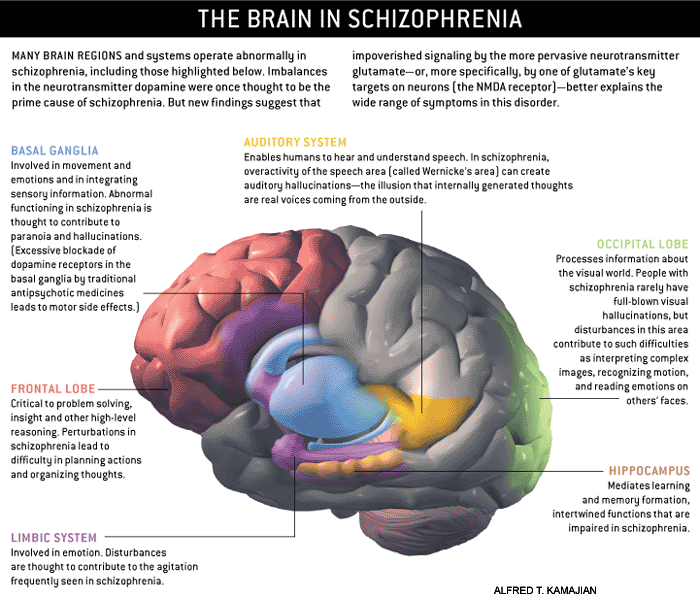Perspectives Program
Help for adults with autism spectrum disorders
Psychosocial treatment, or non-drug interventions involving psychological and social therapy, may help adults with autism spectrum disorders learn to interact better with others, manage their emotions, feel more comfortable in social situations, and accomplish their life goals.
The Perspectives Program aims to study how best to help adults with autism spectrum disorders using psychosocial treatment. The Center for Excellence in Autism Research at the University of Pittsburgh has begun the Perspectives Program, a psychosocial treatment research program, to study and treat adults with autism spectrum disorders. Participants will be treated for up to 18 months with either Cognitive Enhancement Therapy or Enriched Supportive Therapy. These psychosocial research interventions provide support and are designed to improve social functioning, problem solving, stress management, and more…
In addition to receiving these research interventions, participants may also be asked to complete interviews, computer testing, and diagnostic assessments. Participants will be compensated for completing these activities, and will not be billed for treatment provided by the program.
What is Cognitive Enhancement Therapy?
This research treatment aims to help with problems in thinking, planning, and socialization. Participants begin with cognitive training using computer software programs. They also participate in a small social-cognitive group to learn about their condition and how to act wisely in social situations by developing the abilities needed to understand another person’s perspective, evaluate social contexts, and be foresightful.
Time commitment: about 3½ hours per week
What is Enriched Supportive Therapy?
This research treatment uses individual supportive therapy to help adults learn about their condition, manage their emotions and stress, improve their social skills, and cope with everyday problems. Participants will learn about the impact of stress on their lives, and how to identify their own early cues of distress and apply effective coping strategies.
Time commitment: about 1 hour per week
Who is Eligible to Participate ?
Individuals with the following characteristics are eligible to participate in the Perspectives program:
• Age 16–45
• Diagnosis of Autism Spectrum Disorder
• Ability to speak and read English
• IQ>80
Is There a Charge to Participate?
There is no charge for any of the research procedures, including Cognitive Enhancement Therapy and Enriched Supportive Therapy appointments. Participants are offered compensation for completing research assessments.
How to Contact Us
The referring clinician (or interested patient and family) can contact us through the University of Pittsburgh Center for Excellence in Autism Research toll free, at 1-866-647-3436 or by e-mail at autismrecruiter@upmc.edu. Please leave a message with your name and contact information if you receive an answering machine. The Perspectives Program is located at Webster Hall, 4415 Fifth Avenue, Suite 140M (on the Mezzanine floor) in the Oakland section of Pittsburgh. Parking is provided.
Tour the Perspectives Program
Support for the Perspectives Program is provided by the National Institute of Mental Health, Department of Defense, Autism Speaks, and the Pennsylvania Department of Health.
ESSENCE Program
Help for young adults in the early course of schizophrenia
New evidence suggests that early psychological treatment after a person has first become ill with a psychotic episode, may reduce the level of impairment. The ESSENCE Program aims to study how best to help adults in the early course of schizophrenia using psychosocial treatment.
The ESSENCE Program is a treatment study for people diagnosed with schizophrenia, schizoaffective or schizophreniform disorder. Participants will be treated for up to 18 months with either Cognitive Enhancement Therapy or Enriched Supportive Therapy, both of which have been shown to help people with schizophrenia.
In addition to receiving these research interventions, participants may also be asked to complete interviews, computer testing, and neuroimaging assessments. Participants will be compensated for completing these activities, and will not be billed for treatment provided by the program.
What is Cognitive Enhancement Therapy?
This research treatment aims to help with problems in thinking, planning, and
socialization. Participants begin with cognitive training using computer software
programs. They also participate in a small social-cognitive group to learn about their condition and how to act wisely in social situations by developing the abilities needed to understand another person’s perspective, evaluate social contexts, and be foresightful.
Time commitment: about 3 1/2 hours per week
What is Enriched Supportive Therapy?
This research treatment uses individual supportive therapy to help adults learn about their condition, manage their emotions and stress, improve their social skills, and cope with everyday problems. Participants will learn about the impact of stress on their lives, and how to identify their own early cues of distress and apply effective coping strategies to manage their illness.
Time commitment: about 1 hour per week
Who is Eligible to Participate?
Individuals with the following characteristics are eligible for the ESSENCE program:
- Age 18-65
- Diagnosis of schizophrenia, schizoaffective, or schizophreniform disorder within the past 8 years
- Taking prescribed antipsychotic medication
- No diagnosis or history of seizures, head trauma or mental retardation
- No drug or alcohol abuse in the last 3 months
- Ability to speak and read English
Is There a Charge to Participate?
There is no charge for any of the research procedures, including Cognitive
Enhancement Therapy and Enriched Supportive Therapy appointments. Financial
reimbursement for travel to the clinic is available, and participants could receive up to $975 for completing the study.
How to Contact Us
The referring clinician (or interested patient and family) can contact us by calling intake staff at 412-586-9000 or 412-246-5957. Please leave a message with your name and contact information if you receive an answering machine. The ESSENCE Program is located at Webster Hall, 4415 Fifth Avenue, Suite 142M in the Oakland section of Pittsburgh. Parking is available at Webster Hall (use the Bellefield Avenue entrance).
Support for the ESSENCE Program is provided by the National Institute of Mental Health.
Autism
Autism, Asperger’s syndrome, and Autism Spectrum Disorder are neurodevelopmental conditions that are characterized by:
- Difficulties in social interaction
- Developmental delays or persistent difficulties in verbal and non-verbal communication
- Restricted repetitive and stereotyped interest
These conditions are usually present in early childhood (before 3 years of age), but may go undetected, undiagnosed, or misdiagnosed for many years.
The ASCEND Program is currently working to develop new treatments for verbal adults with autism spectrum disorders. You can find more about this initiative by reading about the Perspectives Program.
Schizophrenia
Schizophrenia and schizoaffective disorder are neurodevelopmental conditions that are characterized by:
- Hallucinations – seeing or hearing things that others cannot see
- Delusions – strongly held beliefs despite evidence that they are false
- Disorganized speech and behavior
- Negative symptoms – difficulty with motivation, expressing emotion, or using language elaborately
- Difficulties with social and work functioning
- In the case of schizoaffective disorder, depressed or manic mood
Schizophrenia usually develops in the late teens or early adulthood years, and frequently disrupts important life transitions (e.g., finishing college, beginning a career). However, the development of schizophrenia does not mean one will never recover. With appropriate medication and psychological treatment, recovery is possible and common.
The ASCEND Program is working to develop new treatments for young adults who have recently developed schizophrenia or schizoaffective disorder. You can find more about this initiative by reading about the ESSENCE Program.




